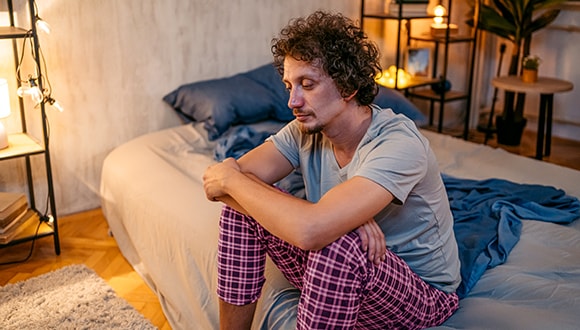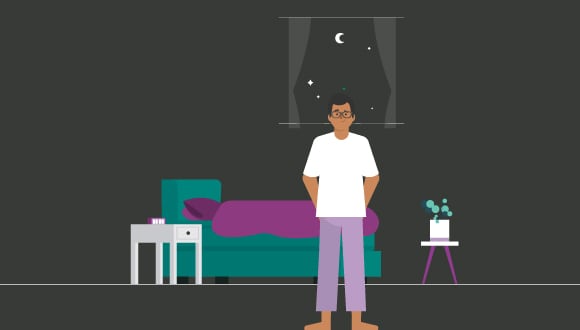Anxiety at night: How worry affects your sleep
Published May 2024 | 6 min read
Expert contributors Dr Moira Junge, CEO at the Sleep Health Foundation and adjunct clinical associate professor at Monash University; Steven Perlen, CEO of Sleepfit
Words by Angela Tufvesson
Anxiety and sleep problems are closely linked. Worry can cause poor sleep, while sleep troubles can lead to anxiety. Here’s how to break the cycle.
Do you lie in bed, dwelling on the day’s worries and feel so anxious that you’re unable to fall asleep – and stay asleep? Perhaps when you get up in the morning, tired and frustrated, a growing lack of sleep worsens your anxiety, and the pattern repeats the following night. This negative feedback loop can exacerbate stress and sleep deprivation, leading to insomnia and anxiety disorders.
“It sets up this vicious cycle of worry. When you don't sleep well, you worry your daily functioning is going to be worse, which means you’re prone to not sleeping well the next night, too,” explains Dr Moira Junge, CEO at the Sleep Health Foundation and an adjunct clinical associate professor at Monash University.
Thankfully, it’s possible to break the cycle and ease anxiety at night with practical lifestyle changes and evidence-based treatments.
How can lack of sleep cause anxiety and vice versa?
Most of us experience anxiety at some point, perhaps about a specific problem or during a particular time of life. However, if these anxious feelings are persistent, arise from no real reason, or if they are starting to affect you on a daily basis, it may be the sign of an anxiety disorder. Anxiety disorders are a group of mental health conditions, which include panic attacks, social phobia, obsessive-compulsive disorder (OCD) and post-traumatic stress disorder. It’s estimated that one in four Aussies are affected by an anxiety disorder at some stage in their life.
Anxiety is frequently connected to sleeping problems. Steven Perlen, CEO of Sleepfit, says both short-term anxiety and anxiety disorders can impact sleep.
“If you're overly anxious, worried about things and can't calm your mind at night, it's really hard to get to sleep and get that recuperative sleep you need,” he says.
Dr Junge adds that anxiety can prevent sleep because the body is in a heightened, active state rather than being relaxed.
“There’s a whole set of processes that get us ready for sleep – like a reduction in stress hormones cortisol and adrenaline, and the calming effects of darkness and melatonin,” she explains. “But if there's anxiety and stress, we're switched on and we're adrenalised. Instead of cortisol dropping, it's going up. This disrupts the normal processes that the brain needs for sleep.”
Indeed, serious sleep disturbances like insomnia – which affects around 10% of people at any given time and can include difficulty falling asleep, waking during the night and waking up too early – have long been associated with anxiety disorders.
Strong evidence also suggests that sleep deprivation can trigger or worsen anxiety disorders. It’s believed that people who are prone to anxiety are especially sensitive to the effects of insufficient sleep on their mood and emotional wellbeing. Research shows that just a single night of sleep deprivation leads to significant increases in activity in the part of the brain that plays a key role in emotion – in particular, anxiety.
This means anxiety and sleep deprivation can be self-reinforcing – worry causes poor sleep, while ongoing sleep troubles lead to increased anxiety.
“There's a very strong, well-documented bidirectional link between sleep and mental health issues like anxiety,” says Steven. “If you have poor sleep, you’re at greater risk of a mental health issue. And if you have a mental health condition like anxiety, you’re more likely to develop a sleep disorder.”
Why do I get anxiety at night?
Anxiety can get worse at night. Without the distractions of the day, you might find yourself lying in bed and focusing on your worries. For some people, these worries are short term and issue specific, like a looming work deadline or an unwell family member, and Dr Junge says sleep often tends to improve once the stressor passes.
For others, worry about not being able to get to sleep can compound other things you’re worried about, exacerbate insomnia and make falling asleep even more difficult. Dr Junge calls this “sleep specific anxiety” and says it can be tricky to overcome.
“For the person who's anxious, if we give them a long list of sleep hygiene rules, including things like going to bed at the same time each night, doing meditation and drinking chamomile tea, they can get hooked into too much rigidity and too much focus on what’s called ‘sleep effort’,” says Dr Junge.
Symptoms of anxiety at night can include:
- worry and fear about the future
- restlessness
- tense muscles and sweating
- nightmares
- obsessive thinking and catastrophising
- headaches
- racing heart.
Insomnia and anxiety disorders can each have a negative impact on your physical and mental wellbeing. And when they occur together, the ongoing health effects can be greater than when each occurs on its own.
How to calm anxiety at night
Dr Junge says the “gold-standard treatment” for both anxiety and insomnia is cognitive behavioural therapy (CBT), or cognitive behavioural therapy for insomnia (CBT-I), a type of talking therapy that works to reorient negative thinking. Using these techniques, she adds, as many as 70% to 80% of people with insomnia experience improvements in their sleep habits.
“Even though it sounds intimidating, CBT is a really simple, gentle approach that helps you identify the root cause of your sleep problems,” says Dr Junge. “Everything else is a temporary solution that doesn’t target the underlying cause.”
For people with both anxiety and insomnia, there’s also evidence that treating insomnia with CBT-I offers flow-on benefits for anxiety. Counsellors and psychologists can provide CBT.
This Way Up is an online initiative developed by expert psychiatrists and clinical psychologists, providing access to a range of clinically proven CBT-based treatment programs. With 18 self-paced courses for a range of mental challenges like stress, insomnia, worry, anxiety and depression, the programs are designed to help you take control of your mental wellbeing. Eligible HCF members* with extras cover can claim the cost of eligible $59 programs up to their annual limit. Plus, for a limited time, the insomnia program is available free to all Aussies.
If you’re unsure whether you need professional help, Steven says the Sleepfit app can screen for your risk of insomnia, in addition to other common sleep disorders. As well as offering sleep solutions, Sleepfit offers a range of tools that help to improve your mental wellbeing, including mindfulness, breathing and relaxation exercises. Eligible HCF members^ can get a free 12-month subscription to the Sleepfit app designed to improve sleep and overall wellbeing.
Practical lifestyle changes can also help you to sleep better and feel less anxious. Dr Junge recommends avoiding alcohol altogether. “It makes you fall asleep faster, but your sleep amount and sleep quality will be really poor,” she says. “Alcohol makes sleep and anxiety worse.”
Instead, she recommends waiting until you feel tired before going to bed – no matter how late it gets. “Don’t lie in bed awake,” says Dr Junge. “Try not to look at the clock… just sit up as long as you can and wait for your natural systems to kick in.”
To break the cycle and reduce anxiety at night, it’s also helpful to remember you can survive on poor sleep temporarily. “Try to take the focus away from having to sleep better,” advises Dr Junge. “The last thing you need to do is be too vigilant about your sleep, because this approach will keep you in a state of hyper-arousal.
“The beauty about sleep is that you don't have to do anything – you just need to wait for it to come to you. And it will come eventually.”
Helping you with the support you need
Everyone’s mental health journey is different, and often finding where to go for support for yourself or your loved ones can be challenging. It’s important to speak to your GP if you are having problems sleeping. HCF has also gone above and beyond to develop a holistic mental health and wellbeing program for eligible members with quick and easy access to a range of options to suit different needs, and the freedom to choose which is right for them.
If you're struggling and need to speak to someone now, you can also call Lifeline on 13 11 14.
related articles
How to talk about anxiety
Talking about your anxiety to other people doesn’t need to be a scary prospect. Here’s how to raise the topic to make sure you get the support you deserve.
Effects of sleep deprivation
We all have the occasional bad night’s sleep, but not getting enough shut-eye can be harmful to your health. Here’s how to build healthier sleep patterns.
How to improve insomnia
Women are more likely to experience insomnia than men, due to hormones and higher rates of anxiety. Struggling to sleep? Here are some expert tips.
The symptoms of anxiety
What anxiety looks and feels like is different for everyone. Here are some of the more common symptoms of anxiety and how to lessen their impact.
IMPORTANT INFORMATION
* This service is not affiliated or associated with HCF in any way. You should make your own enquiries to determine whether this service is suitable for you. If you decide to use this service, it’ll be on the basis that HCF won’t be responsible, and you won’t hold HCF responsible, for any liability that may arise from that use.
^ Eligibility criteria apply. See hcf.com.au/sleepfit for details.
This communication contains information which is copyright to The Hospitals Contribution Fund of Australia Limited (HCF). It should not be copied, disclosed or distributed without the authority of HCF. Except as required by law, HCF does not represent, warrant and/or guarantee that this communication is free from errors, virus, interception or interference. All reasonable efforts have been taken to ensure the accuracy of material contained on this website. It’s not intended that this website be comprehensive or render advice. HCF members should rely on authoritative advice they seek from qualified practitioners in the health and medical fields as the information provided on this website is general information only and may not be suitable to individual circumstances or health needs. Please check with your health professional before making any dietary, medical or other health decisions as a result of reading this website.

